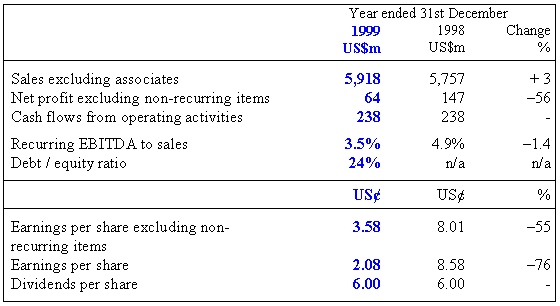
| To: Business Editor | 28th February 2000 For immediate release |
The following announcement was today issued to the London Stock Exchange.
DAIRY FARM INTERNATIONAL HOLDINGS LIMITED
1999 PRELIMINARY ANNOUNCEMENT OF RESULTS
Results

"The performance of the Group in 2000 will be significantly influenced by the competitive conditions in Hong Kong where the profit in the first half of 2000 will be lower than last year. Speeding the recovery at Franklins in Australia, however, remains our top priority."
Simon Keswick, Chairman
"We remain confident that the Group has the right vision and the plan, the people and the capital to achieve its objectives."
Ronald J Floto, Group Chief Executive
28th February 2000
The final dividend of US¢4.35 per share will be payable on 7th June 2000, subject to approval at the Annual General Meeting to be held on 31st May 2000, to shareholders on the register of members at the close of business on 24th March 2000. The ex-dividend date will be on 22nd March 2000, and the share registers will be closed from 27th to 31st March 2000, inclusive.
DAIRY FARM INTERNATIONAL HOLDINGS LIMITED
PRELIMINARY ANNOUNCEMENT OF RESULTS
FOR THE YEAR ENDED 31ST DECEMBER 1999
OVERVIEW
While the economic environment in Asia Pacific has shown some recovery during 1999, the improvements have not been consistent across the Region. The effects of declining consumer spending and price deflation in Hong Kong were exacerbated by a supermarket price war. This and a setback in the recovery of Franklins in Australia have significantly affected Dairy Farm's results. Notwithstanding this difficult environment, through its acquisitions in South Asia, the Group has taken further steps towards realising its vision of becoming the leading food and drugstore retailer in the Asia-Pacific Region. The Group has also returned value to its shareholders through a special dividend of US$178 million.
PERFORMANCE
Dairy Farm International Holdings Limited today announced that sales from its subsidiaries of US$5,918 million were 3% ahead of last year with growth in Australia, Southeast Asia and New Zealand offset by a decline in supermarket sales in Hong Kong.
Operating profit before non-recurring items of US$55 million was 64% less than last year due mainly to the performance of Wellcome in Hong Kong and Franklins in Australia. Franklins had disappointing sales and higher operating costs resulting in a significantly reduced contribution in the second half. The Group's retail businesses in New Zealand and Southeast Asia and its convenience and drugstore businesses in Hong Kong performed well. Losses in the first year of operation at Géant, the Group's hypermarket joint venture in Taiwan, and reduced profits at Hong Kong Maxim's were partly offset by a substantially improved performance by Hero in Indonesia. The Group's recurring EBITDA of US$205 million was 26% below last year.
Consolidated net profit was US$37 million compared with US$157 million in 1998. Excluding non-recurring items, earnings per share of US¢3.58 were 55% below last year.
Following the payment of the special dividend in November, the Group's balance sheet moved into a net debt position and at the year end the gearing ratio was 24%. This has enhanced the efficiency of the balance sheet.
In view of the Group's strong cash flow, the Directors consider it appropriate to maintain the dividend at the same level as 1998. A final dividend of US¢4.35 per share is therefore recommended, payable in cash which, together with the interim dividend of US¢1.65 per share, will make a total annual dividend of US¢6.00 per share.
BUSINESS DEVELOPMENTS
Turning to the operations, the Chairman, Simon Keswick, said that the Group significantly expanded its presence in Southeast Asia in 1999 with the acquisition of 90% of Giant in Malaysia which operates two hypermarkets and five supermarkets, together with the purchase of eight Tops supermarkets in Singapore and a 49% shareholding in the 29-store Foodworld supermarket chain in India. In addition to the investment in Hero in 1998, Dairy Farm is now the largest food retailer in Southeast Asia. Further investment opportunities in this fast growing Region are being actively considered.
The implementation of shared services has been completed successfully in Hong Kong and contributed positively to the results for the year. The disappointing performance of the Géant hypermarket joint venture reflects the oversupply of hypermarkets in Taiwan. The Group is now reviewing the strategy for this business with its partner, Casino of France.
The Group opened 194 new stores in the year, principally in Hong Kong, Australia and Singapore, bringing its year-end total to 1,583. Including associates, it has an interest in 2,063 outlets in nine territories. Capital investment, including acquisitions, amounted to US$407 million. This investment programme will continue in 2000 when the Group plans to invest a further US$300 million.
OUTLOOK
In conclusion, Simon Keswick said, "The performance of the Group in 2000 will be significantly influenced by the competitive conditions in Hong Kong where the profit in the first half of 2000 will be lower than last year. Speeding the recovery at Franklins in Australia, however, remains our top priority. We expect that improvements in the performance of Franklins will occur gradually over the next two years.
"In the meantime, the Group's focus will remain on increasing fresh food sales, developing new formats and improving efficiency and retail execution. The Group's balance sheet remains strong and management will continue to seek new investment opportunities in the Region."
GROUP CHIEF EXECUTIVE'S REVIEW
OPERATING PERFORMANCE
Though anticipating a difficult 1999, our results for the year have been worse than expected. The 57% reduction in recurring profit before interest to US$79 million was driven by extremely difficult market and competitive conditions in Hong Kong and a setback in the recovery of Franklins in Australia.
Declining consumer spending in Hong Kong was worsened by a severe supermarket price war beginning in August. The price war has significantly reduced the profitability of our Hong Kong supermarket business and the impact continues today. Although our 7-Eleven convenience stores and Mannings drugstores performed well, the decline in Wellcome's profit led to a US$60 million reduction in our total retail operating profit in Hong Kong. The setback in the recovery of Franklins resulted from disappointing sales growth in the very competitive Australian market and increased expenses related to our fresh store roll-out program. Our top priorities to resume the recovery are to build sales and to reduce expenses in-store and at the division level.
Elsewhere, our businesses in Southeast Asia had an excellent year with strong growth in sales and profits in Singapore and much improved results at Hero, our 32% owned associate in Indonesia. Woolworths in New Zealand, while having a difficult first half, recovered strongly in the second half and is well positioned for further improvement. Hong Kong Maxim's group, our 50% owned associate, performed well and maintained its market share despite deflationary food-away-from-home sales. Sales and operating performance of the Géant hypermarket joint venture in Taiwan were substantially below expectations, reflecting overstored conditions in the Taiwan hypermarket segment. As a result, we have reduced the carrying value of this investment by US$5.6 million and we are now addressing the future of Géant with our partners, Casino.
The Group's recurring EBITDA , our primary performance measure, of US$205 million declined to 3.5% of sales, down from 4.9% in 1998.
STRATEGIC DIRECTION
The strategic direction of the Group remains unchanged. Food, convenience and drugstore retailing make up 98% of the Group's activities and are focused wholly within the Asia-Pacific Region. Investments are concentrated on improving our existing businesses. We invested US$233 million in new, expanded and remodeled stores in 1999 and plan to spend over US$200 million in 2000. Our investment policy is to give priority to:
We will continue to expand our existing businesses by acquisition and will also pursue investment opportunities in new markets in Asia Pacific.
ACHIEVEMENT OF OBJECTIVES
Notwithstanding the performances at Franklins and Wellcome, we have achieved our objectives in other areas:
We will continue to pursue these objectives in 2000.
SYSTEMS, TECHNOLOGY AND E-COMMERCE
Our continued investment in systems reflects the need for modern technology to remain competitive. The Year 2000 transition was completed smoothly. The total cost of this program was US$38 million compared with our estimate of US$40 million.
We have been operating E-Commerce businesses in Hong Kong, Singapore and New Zealand since 1998 and, while modest today, we anticipate significant growth. Dairy Farm is committed to developing this emerging channel to add incremental sales through the delivery of convenience and value-added services to customers. In Hong Kong, we are developing plans to expand into higher-end food and wines under the Oliver's banner and a "health & beauty club" under the Mannings banner. 7-Eleven has launched a pick-up service for products ordered through the Hongkong.com website, and is exploring an in-store kiosk for online services. The Group also plans to explore business-to-business E-Commerce opportunities through our wholesaling and distribution business, Sims Trading.
THE FUTURE
Our vision, strategy and objectives are unchanged. The focus of attention in 2000 will be on building the underlying sales and improving the profitability of each business. To achieve these objectives, each business will:
In line with this policy, we reduced the cost of our support functions at Group level by US$5 million in 1999 and plan a further reduction in 2000.
All investments made by the Group are assessed on the basis of the incremental value they deliver to shareholders. Each is required to add economic value in excess of the Group's cost of capital. These principles guide our investment policy and have led to the reshaping of our balance sheet over the last two years. In addition to normal dividends, we have returned some US$396 million to shareholders, and the Group now has net debt of US$209 million compared with a cash surplus of US$74 million in 1997. Our shareholders will benefit from the greater efficiency of our balance sheet while the Company continues to maintain the financial strength to develop its business and weather difficult economic and trading conditions.
The two key issues for Dairy Farm in 2000 are to reverse the sales and expense trends at Franklins and to restore the profitability of Wellcome. The turnaround of Franklins will, however, take time and we do not expect significant improvement in cash operating profit until 2001. It is not practical to anticipate the end of the price war in Hong Kong, but it is likely to continue at some level for much of this year. This will inevitably reduce the profit from Hong Kong in the first half of 2000. We plan to alter our strategy regarding the Géant hypermarket business in Taiwan during the first half of the year. Elsewhere, we expect continued improvement in New Zealand and Southeast Asia.
We remain confident that the Group has the right vision and the plan, the people and the capital to achieve its objectives.
People make the difference in retailing. Ours have managed well in a particularly difficult year. Their hard work and dedication is greatly appreciated. I thank them and ask for their continued support in the coming year.
Ronald J Floto
Group Chief Executive
28th February 2000
REGIONAL OPERATING REVIEW
NORTH ASIA
Hong Kong - The retail businesses in Hong Kong have had a difficult year in the face of increased competition, ongoing food price deflation and the supermarket price war which started in August. While there have been signs of modest improvement, the economic and competitive environment is expected to continue for the foreseeable future and recovery will be gradual.
Wellcome supermarkets were worst affected of all our businesses by the adverse conditions, with sales and profits lower than last year. Reduced consumer spending and price deflation have affected the business since late 1998. This difficult economic environment was exacerbated by a price war starting in August. Though the price war increased sales and product volumes, the decline in margins and increases in logistics and advertising expense significantly reduced the profits. Wellcome lost market share in the first half as competitors increased their total retail floor space, but has responded with its own program of new store openings and major refurbishments. We opened 21 new stores and refurbished 17 during the year and plan to continue refurbishments in 2000 and open 20 new supermarkets a year for the next three years. The proportion of fresh sales increased from 8% to 10% of total sales and continued growth will be a priority in 2000. We have substantially increased the capacity of our E-commerce and home delivery business in 1999 with the installation of new systems. Sales at 7-Eleven convenience stores, though also affected by the price war, performed well achieving an increase in sales and profits for the year. Mannings had an excellent year with the continued rollout of its new "health and beauty" format stores and the reformatting of its "value" stores, delivering strong sales and profit growth. The health and beauty format stores now represent 90 out of 146 stores.
The implementation of shared services in Hong Kong was completed ahead of schedule and within budget. This has generated economies of scale, reduced overheads and improved margins through the leveraging of the combined purchasing power of the Group's retail businesses in Hong Kong. This initiative has generated US$10 million of benefits in 1999 and we expect annual benefits of US$15 million going forward.
The Group added 73 stores in Hong Kong in 1999, bringing the total to 759, consisting of 233 Wellcome supermarkets, 380 7-Eleven stores and 146 Mannings drugstores.
Sales at our wholesaling business, Sims Trading, were flat and profits declined as margins were squeezed in the difficult Hong Kong market. Sims has, however, successfully expanded its network in China, which will provide the engine for future growth. Ice manufacturing, which serves the fishing and construction industries, also declined as both these industries continued to be affected by the economic downturn. The demand for ice in Hong Kong has progressively declined as the fishing fleet has moved to China and this business will be restructured as individual ice plants, which are generally located on valuable property, cease to add value.
Hong Kong Maxim's group, our 50% owned associate, maintained market share in a competitive and deflationary market in Hong Kong. Operations benefited in particular from innovative new formats such as Hello Kitty Café Eating Plus, Mezz and Thai Basil combined with excellent cost control. At the year end, Maxim's operated 293 restaurants, fast food outlets and cake shops, principally in Hong Kong. In Mainland China, the company has an interest in 17 catering outlets and continues to participate in joint venture aircraft flight kitchen businesses at seven major airports. Maxim's strategy is to continue to introduce new formats and to redecorate its restaurants to a more modern, bright ambiance.
Mainland China - Our 7-Eleven convenience stores have made excellent progress during the year and are now profitable at store level. We expect this improvement to continue. We are in the process of restructuring the 7-Eleven joint ventures to take account of the new regulations on foreign investment in the retail industry so that we can expand our network beginning in the second half of 2000. We believe that Guangdong province offers the potential for a chain of some 500 convenience stores within the next ten years.
Taiwan - Second half profits at Wellcome supermarkets improved as the company continued to strengthen its neighbourhood supermarket positioning by expanding its fresh food offer. During the year, the company refurbished one third of its stores and established a fresh food processing centre to support the development of fresh sales. The company performed better than expected despite the significant impact of the September earthquake.
DFI Géant, our 50% owned joint venture with Casino S.A., opened its second Géant hypermarket in Kaohsiung in March. The sales and operating performance of these stores are well below expectations reflecting the oversupply of hypermarkets in Taiwan.
SOUTH ASIA
Singapore - Sales and operating profit increased by 12% and 22% respectively in Singapore as all retail banners performed well. Cold Storage supermarkets benefited from their new format stores and renewed focus on fresh food and promotion. Improvements at Guardian pharmacies were driven by their new format focusing on health and beauty combined with innovative promotions. In December 1999, we acquired the remaining 30% shareholding in Guardian. Following the acquisition of eight Tops supermarkets in October, we now operate 33 Cold Storage supermarkets, 109 7-Eleven convenience stores and 55 Guardian pharmacies.
Malaysia - In July, we increased our shareholdings in the 57 store Guardian pharmacy chain to 65% and in the seven store Wellsave supermarket chain to 75%. Our presence in Malaysia was significantly increased by the acquisition in December of 90% of Giant which operates two hypermarkets and five supermarkets under the Giant banner. The combined sales of the Malaysian businesses in 1999 was in excess of US$280 million. This acquisition strengthens our position as a leading retailer in the country and provides the general merchandise expertise to operate hypermarkets in other Asian markets.
Indonesia - Despite continuing economic difficulties Hero Supermarkets, our 32% owned associate, had an excellent year. Fundamental improvements in the underlying operations were enhanced by the strengthening Rupiah and by the settlement of insurance claims relating to the riots in 1998. At the year end, the company operated 66 Hero supermarkets, 25 Guardian pharmacies, 24 Starmart convenience stores and 11 Mitra discount grocery stores, and is well positioned to take advantage of the expected growth in this market.
India - Dairy Farm has two joint ventures with the RPG Group, operating 32 Foodworld supermarkets and 10 Health & Glow drugstores in Southern India. These ventures represent the largest organised retailing business in India and are a sound platform for planned future expansion in this developing market. These chains are based in three regional hubs of Chennai, Bangalore and Pune. We expect to add 25 new stores next year.
AUSTRALASIA
Australia - Sales at Franklins, particularly in the second half, were below expectations due mainly to the strong promotion and store development programs of our competitors. This, combined with the higher costs of operating the Fresh stores and higher support office costs, has resulted in a breakeven operating performance compared with a A$63 million operating profit last year. Recurring EBITDA declined from 3.5% of sales to 2.5% reflecting the relatively better performance of the business on a cash basis. The setback in Franklins' recovery is disappointing but we are confident in the strategy of focusing on fresh food, which now represent 15% of total sales, and improving the efficiency of the business and will continue to pursue it in 2000. Recent openings of larger Fresh Food stores, conversions of No Frills and store acquisitions have performed well and demonstrate the customers' preference for one-stop shopping in comfortable modern supermarkets offering value for money. Our top priorities are to build sales with more effective and consistent advertising, improved range management, the implementation of a new forecasting and replenishment system to improve in-stock performance and better in-store execution across the board. Our operating efficiency will improve with the introduction of shared services, better labour utilisation, centralisation of non-trade procurement and the consolidation of all support staff from three offices into one in Sydney. The company is preparing for the introduction of a GST in 2000 which has a total project cost estimated at US$3.8 million, half of which has been incurred in 1999.
During the year we invested US$93 million in stores, up from US$47 million in the previous year. The growth program included eight new stores, 10 store acquisitions, 12 conversions and 27 refurbishments. At the year end, 187 of our 284 stores were Fresh stores, with 97 No Frills stores remaining mainly in the Sydney area. This investment program will continue in 2000 as we extend the Franklins network into larger fresh food supermarkets. We expect to make steady improvements to the business but this will not be fully reflected in operating profit until 2001 and subsequent years.
New Zealand - Sales at Woolworths increased by 4% in local currency with a strong performance in the second half. Operating profit in the second half was above the prior year following a first half marked by fierce competition in the Auckland area. Woolworths has the highest proportion of fresh produce sales in Dairy Farm, 31% of total sales, and this important category continues to be a source of expertise for the growing Fresh business across the Group. The 1999 investment program focused on the major refurbishment of 18 stores at a cost of US$21 million. We added one new Woolworths supermarket during the year, and now have 46 Woolworths supermarkets, 14 Big Fresh stores and 18 Price Chopper stores in New Zealand. We expect that our 2000 investment program together with the price repositioning achieved in 1999 and aggressive promotions will increase our market share this year.

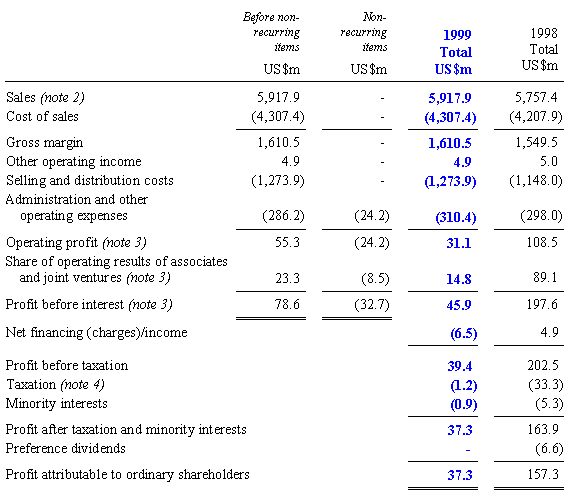


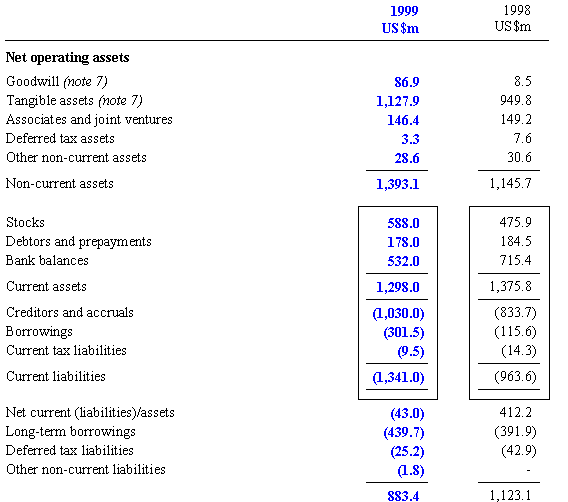
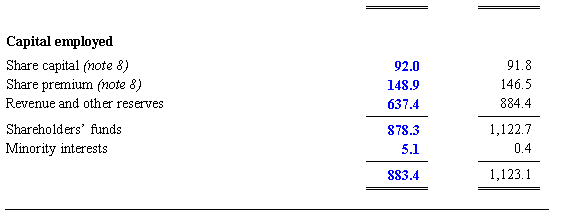

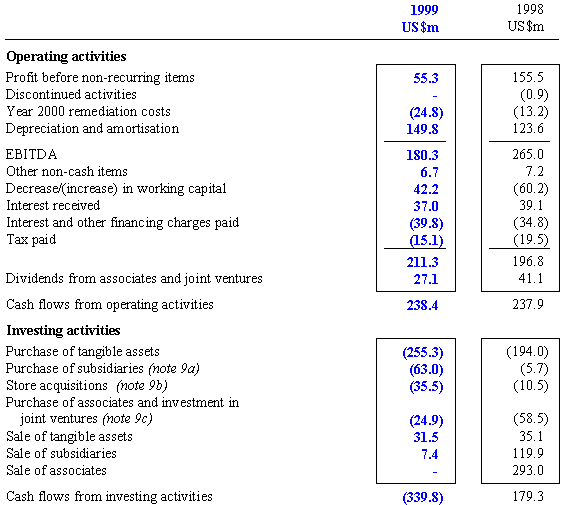
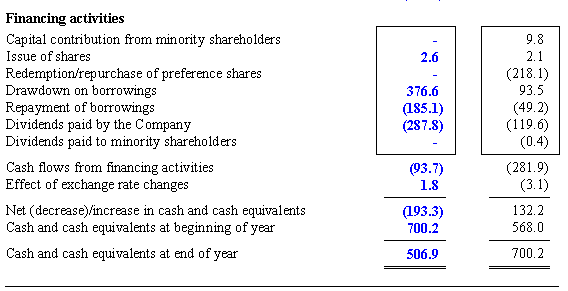

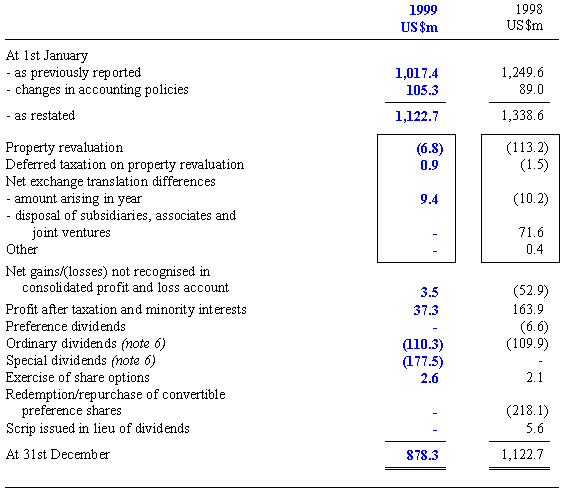

1. ACCOUNTING POLICIES AND BASIS OF PREPARATION
The financial information contained in this announcement has been based on the audited results for the year ended 31st December 1999 which have been prepared under the historical cost convention, as modified by the revaluation of certain non-current assets, and in conformity with International Accounting Standards on the basis of the accounting policies set out in the Financial Statements.
In 1999 the Group implemented IAS 1 (revised 1997) - Presentation of Financial Statements, IAS 14 (revised 1997) - Segment Reporting, IAS 17 (revised 1997) - Leases, IAS 19 (revised 1998) - Employee Benefits and IAS 35 - Discontinuing Operations. The provisions of IAS 10 (revised 1999) - Events After the Balance Sheet Date, IAS 16 (revised 1998) - Property, Plant and Equipment, IAS 22 (revised 1998) - Business Combinations, IAS 28 (revised 1998) - Accounting for Investments in Associates, IAS 31 (revised 1998) - Financial Reporting of Interests in Joint Ventures, IAS 36 - Impairment of Assets, IAS 37 - Provisions, Contingent Liabilities and Contingent Assets and IAS 38 - Intangible Assets are applied in advance of their effective dates.
With the exception of IAS 10 (revised 1999) and IAS 19 (revised 1998), there are no changes in accounting policy that affect profit or Shareholders' funds resulting from the adoption of the above standards in these financial statements, as the Group was already following the recognition and measurement principles in those standards.
In accordance with IAS 10 (revised 1999), dividends proposed or declared after the balance sheet date are not recognised as a liability at the balance sheet date. This is a change in accounting policy as in previous years dividends proposed or declared after the balance sheet date were recognised as a liability at the balance sheet date. The effect of this change has been to increase the Shareholders' funds at 1st January 1998 and 1999 by US$79.6 million and US$79.9 million respectively.
In accordance with IAS 19 (revised 1998), pension accounting costs for defined benefit plans are assessed using the projected unit credit method. Under this method, the costs of providing pensions are charged to the consolidated profit and loss account so as to spread the regular cost over the service lives of employees in accordance with the advice of qualified actuaries who carry out a full valuation of major plans every year. The pension obligations are measured as the present value of the estimated future cash outflows by reference to market yields on high quality corporate bonds which have terms to maturity approximating the terms of the related liability. Plan assets are measured at fair value. All actuarial gains and losses are spread forward over the average remaining service lives of employees. This is a change in accounting policy as in previous years pension accounting costs were assessed using the attained age normal method and pension obligations were discounted at the expected rate of return on plan assets. The comparative figures for 1998 have been restated to reflect the change in policy. The effect of this change has been to increase the profit after taxation and minority interests for the year ended 31st December 1998 by US$2.3 million, and the Shareholders' funds at 1st January 1998 and 1999 by US$23.1 million and US$25.4 million respectively.
The Group's reportable segments are set out in notes 2 and 3.
2. SALES
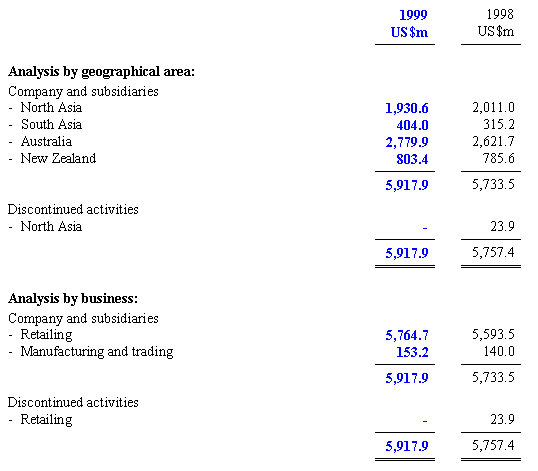
The Group operates in three regions: North Asia, South Asia and Australasia. North Asia comprises Hong Kong, Mainland China and Taiwan. South Asia comprises Singapore, Malaysia, Indonesia and India.
3. SEGMENT OPERATING PROFIT AND PROFIT BEFORE INTEREST
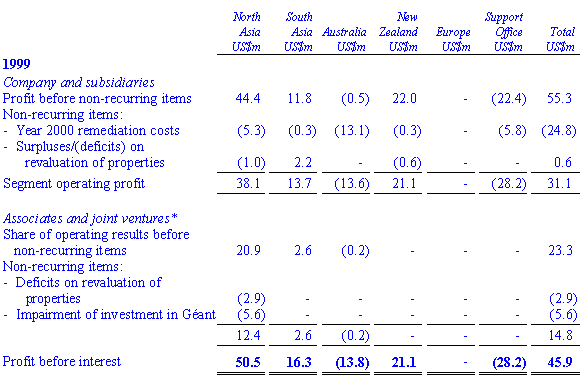
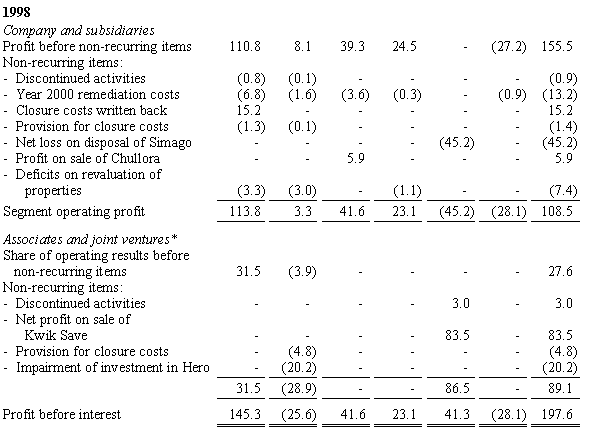
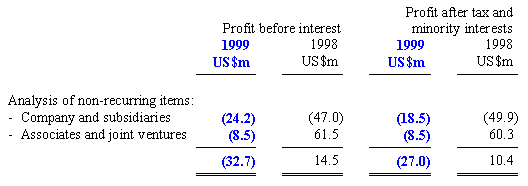
*Associates' results include goodwill amortisation of US$1.5 million (1998: US$4.7 million).
4. TAXATION

Tax on profits has been calculated at rates of taxation prevailing in the territories in which the Group operates and has no tax in the United Kingdom (1998: US$2.7 million).
5. EARNINGS PER SHARE
Basic earnings per share are calculated on the profit attributable to ordinary shareholders of US$37.3 million (1998: US$157.3 million) and on the weighted average number of 1,795.7 million ordinary shares issued during the year (1998: 1,833.0 million). The weighted average number excludes the shares held by the Trustee under the Senior Executive Share Incentive Schemes.
Diluted earnings per share are calculated on the weighted average number of shares after adjusting for the number of shares deemed to be issued for no consideration under the Senior Executive Share Incentive Schemes based on the average share price during the year as follows:

Earnings per share excluding non-recurring items are calculated on the profit after adjusting for non-recurring items as follows:

6. DIVIDENDS
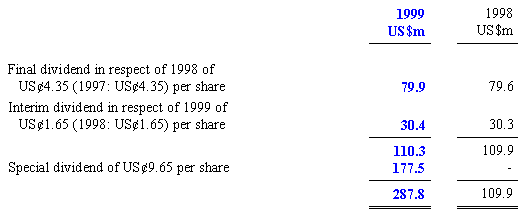
A final dividend in respect of 1999 of US¢4.35 (1998: US¢4.35) per share amounting to a total of US$72.0 million (1998: US$79.9 million) is proposed by the Board. The dividend proposed is not accounted for until it has been approved at the Annual General Meeting and will be accounted for as an appropriation of revenue reserves in the year ending 31st December 2000.
7. CAPITAL EXPENDITURE AND COMMITMENTS
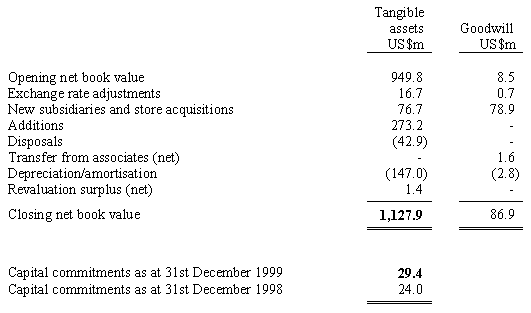
8. SHARE CAPITAL AND SHARE PREMIUM
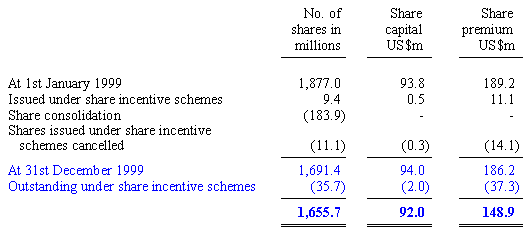
9. NOTES TO CONSOLIDATED CASH FLOW STATEMENT
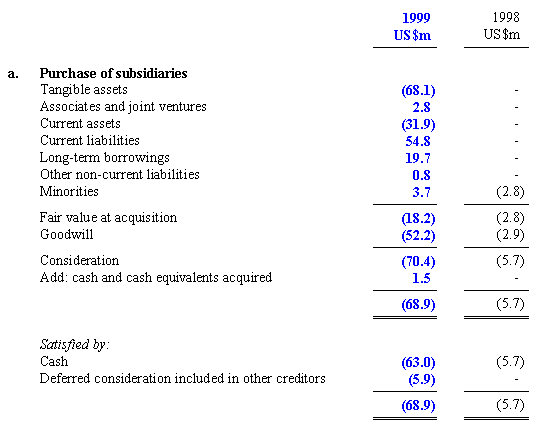
In December 1999, the Group acquired a 90% interest in Giant TMC Bhd (Giant) in Malaysia from a third party for a total consideration of US$60.2 million. Dairy Farm retained 10% of the purchase price, which will be payable based on an "earn-out" formula subject to Giant's net profit for 1999 and 2000. Goodwill on acquisition of US$44.8 million is being amortised over 20 years. The sales and operating profit of Giant since the date of acquisition amounted to US$21.6 million and US$1.9 million respectively.
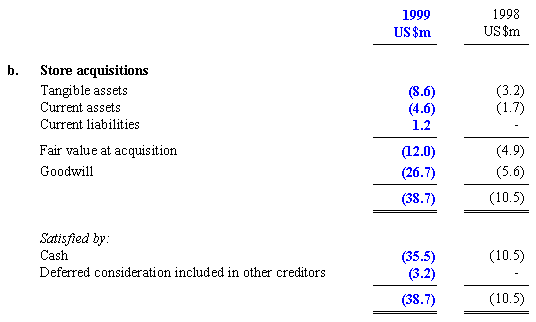
In October 1999, the Group acquired a 100% interest in the operation of 8 Tops supermarkets in Singapore from a third party for a total consideration of US$20.9 million. Goodwill on acquisition of US$13.2 million is amortised over 15 years. The sales and operating loss of Tops since the date of acquisition amounted to US$11.2 million and US$0.2 million respectively.
The sales and operating profit of other stores since the date of acquisition amounted to US$11.2 million and US$0.8 million (1998: US$14.8 million and break-even) respectively.
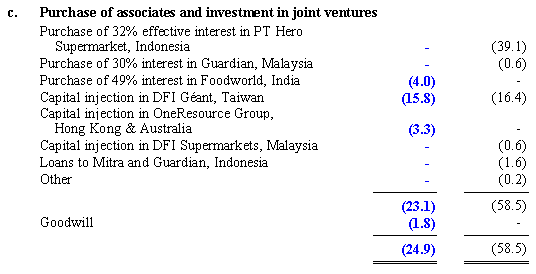
10. ANNUAL REPORT
The Annual Report will be posted to shareholders on or about 25th April 2000. Copies may be obtained from Jardine Matheson International Services Limited, P.O. Box HM 1068, Hamilton HM EX, Bermuda; IRG plc, Bourne House, 34 Beckenham Road, Beckenham, Kent BR3 4TU, England and M & C Services Private Limited, 16 Raffles Quay #23-01, Hong Leong Building, Singapore 048581.
The final dividend of US¢4.35 per share will be payable on 7th June 2000, subject to approval at the Annual General Meeting to be held on 31st May 2000, to shareholders on the register of members at the close of business on 24th March 2000. The ex-dividend date will be on 22nd March 2000, and the share registers will be closed from 27th to 31st March 2000, inclusive. Shareholders will receive their dividends in United States Dollars, unless they are registered on the Jersey branch register where they will have the option to elect for Sterling. These shareholders may make new currency elections by notifying the United Kingdom transfer agent in writing by 19th May 2000. The Sterling equivalent of dividends declared in United States Dollars will be calculated by reference to a rate prevailing ten business days prior to the payment date. Shareholders holding their shares through The Central Depository (Pte) Limited ("CDP") in Singapore will receive United States Dollars unless they elect, through CDP, to receive Singapore Dollars.
For further information, please contact:
| Dairy Farm Management Services Limited | |
| Ronald J Floto Ian Durant | (852) 2299 1881 (office) (852) 2299 1896 (office) email: idurant@dairy-farm.com.hk |
| Forrest International Limited | |
| Bob Fienberg Sue Gourlay | (852) 2501 7908 (office) (852) 2501 7936 (office) email: fienberg@forrestintl.com.hk |
Full text of the Preliminary Announcement of Results and the Preliminary Financial Statements for the year ended 31st December 1999 can be accessed through the Internet at "http://www.irasia.com/listco/sg/dfi".
Copyright 1998 Dairy Farm Group / DISCLAIMER. All Rights Reserved